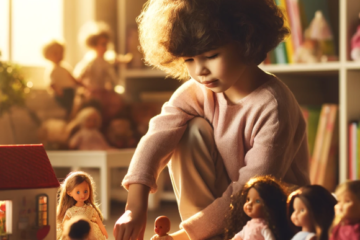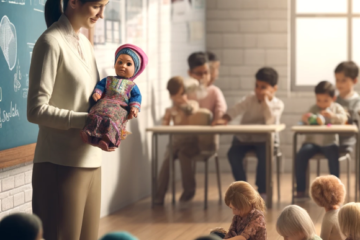Introduction:
Dolls have long been cherished companions for children, transcending mere playthings to become vessels for imagination, empathy, and social development. From traditional rag dolls to modern interactive companions, these timeless toys hold a special place in childhood experiences worldwide. This article delves into the profound impact of dolls on children’s socialization, exploring how these seemingly simple toys facilitate emotional connections, empathy, and interpersonal skills.
Understanding Socialization through Play:
Play is the cornerstone of childhood development, serving as a medium through which children explore, learn, and interact with the world around them. Doll play, in particular, offers a unique avenue for children to simulate social scenarios, experiment with roles, and navigate complex emotions in a safe and nurturing environment. Through imaginative play with dolls, children mimic real-life interactions, fostering crucial social skills essential for building relationships and understanding societal norms.
Empathy and Emotional Intelligence:
Dolls serve as mirrors of emotions, allowing children to project their feelings onto these inanimate companions and explore empathy in a tangible way. Whether comforting a crying doll, role-playing caregiving scenarios, or engaging in pretend conversations, children develop empathy and emotional intelligence through their interactions with dolls. By recognizing and responding to the needs and emotions of their doll companions, children cultivate a deeper understanding of human emotions and the importance of compassion in relationships.
Role-playing and Identity Development:
Dolls offer children a canvas upon which they can paint their dreams, aspirations, and identities. Through role-playing, children experiment with various roles and personas, exploring different facets of themselves and the world around them. Whether pretending to be a parent, doctor, or superhero, doll play allows children to expand their imagination, develop problem-solving skills, and gain insights into social roles and responsibilities. This fluidity in role-playing encourages children to challenge gender stereotypes and embrace diverse perspectives, fostering a more inclusive and empathetic society.
Building Social Bonds:
Dolls serve as catalysts for social interaction, enabling children to engage in collaborative play and form bonds with peers. Whether sharing their dolls with friends, participating in group storytelling, or hosting imaginary tea parties, children learn valuable lessons in cooperation, communication, and conflict resolution through shared play experiences. These collaborative endeavors not only strengthen existing friendships but also foster the development of essential social skills that lay the foundation for healthy relationships in adulthood.
Addressing Diversity and Inclusion:
In an increasingly diverse world, dolls play a vital role in promoting cultural awareness, acceptance, and inclusion among children. By offering dolls representing various ethnicities, abilities, and backgrounds, toy manufacturers contribute to a more representative toy landscape, allowing children to see themselves reflected in their playthings and fostering a sense of belonging and pride in one’s identity. Exposure to diverse dolls also nurtures empathy and appreciation for different cultures, promoting cross-cultural understanding and respect from an early age.
Conclusion:
Dolls hold a remarkable power to shape the social fabric of childhood, serving as more than just toys but as companions that accompany children on their journey of self-discovery and socialization. Through imaginative play, empathy-building activities, and collaborative endeavors, dolls facilitate the development of essential social skills, emotional intelligence, and cultural awareness. As we continue to recognize the profound impact of dolls on children’s lives, let us embrace their role in nurturing empathy, fostering inclusivity, and building a more compassionate society, one playdate at a time.
Introduction:
Dolls have long been cherished companions for children, transcending mere playthings to become vessels for imagination, empathy, and social development. From traditional rag dolls to modern interactive companions, these timeless toys hold a special place in childhood experiences worldwide. This article delves into the profound impact of dolls on children’s socialization, exploring how these seemingly simple toys facilitate emotional connections, empathy, and interpersonal skills.
Understanding Socialization through Play:
Play is the cornerstone of childhood development, serving as a medium through which children explore, learn, and interact with the world around them. Doll play, in particular, offers a unique avenue for children to simulate social scenarios, experiment with roles, and navigate complex emotions in a safe and nurturing environment. Through imaginative play with dolls, children mimic real-life interactions, fostering crucial social skills essential for building relationships and understanding societal norms.
Empathy and Emotional Intelligence:
Dolls serve as mirrors of emotions, allowing children to project their feelings onto these inanimate companions and explore empathy in a tangible way. Whether comforting a crying doll, role-playing caregiving scenarios, or engaging in pretend conversations, children develop empathy and emotional intelligence through their interactions with dolls. By recognizing and responding to the needs and emotions of their doll companions, children cultivate a deeper understanding of human emotions and the importance of compassion in relationships.
Role-playing and Identity Development:
Dolls offer children a canvas upon which they can paint their dreams, aspirations, and identities. Through role-playing, children experiment with various roles and personas, exploring different facets of themselves and the world around them. Whether pretending to be a parent, doctor, or superhero, doll play allows children to expand their imagination, develop problem-solving skills, and gain insights into social roles and responsibilities. This fluidity in role-playing encourages children to challenge gender stereotypes and embrace diverse perspectives, fostering a more inclusive and empathetic society.
Building Social Bonds:
Dolls serve as catalysts for social interaction, enabling children to engage in collaborative play and form bonds with peers. Whether sharing their dolls with friends, participating in group storytelling, or hosting imaginary tea parties, children learn valuable lessons in cooperation, communication, and conflict resolution through shared play experiences. These collaborative endeavors not only strengthen existing friendships but also foster the development of essential social skills that lay the foundation for healthy relationships in adulthood.
Addressing Diversity and Inclusion:
In an increasingly diverse world, dolls play a vital role in promoting cultural awareness, acceptance, and inclusion among children. By offering dolls representing various ethnicities, abilities, and backgrounds, toy manufacturers contribute to a more representative toy landscape, allowing children to see themselves reflected in their playthings and fostering a sense of belonging and pride in one’s identity. Exposure to diverse dolls also nurtures empathy and appreciation for different cultures, promoting cross-cultural understanding and respect from an early age.
Conclusion:
Dolls hold a remarkable power to shape the social fabric of childhood, serving as more than just toys but as companions that accompany children on their journey of self-discovery and socialization. Through imaginative play, empathy-building activities, and collaborative endeavors, dolls facilitate the development of essential social skills, emotional intelligence, and cultural awareness. As we continue to recognize the profound impact of dolls on children’s lives, let us embrace their role in nurturing empathy, fostering inclusivity, and building a more compassionate society, one playdate at a time.



0 Comments